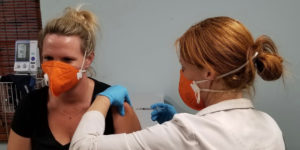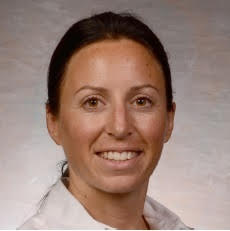
It’s a rush to get people vaccinated against Covid-19 before the virus causing it can mutate into something uncontrollable, and right now we are lagging behind — globally, nationally, and in the Virgin Islands, Health officials say.
The target is a moving one, but the current thinking is that roughly 70 percent of the population needs to be vaccinated in order to curb the spread of the virus. And we are nowhere close.
Only 23.6 percent of the world’s population had received even one dose of the vaccine, as of July 1, according to Our World in Data, an online outlet, and just 11 percent were fully vaccinated. Some vaccines are single-dose, but those in most common use require two doses.
Across the U.S., 55.2 percent of people had received one dose and 47.5 percent were fully vaccinated by the start of this month.
The Virgin Islands numbers are close to the national average. The V.I. Health Department’s figures for July 1 are 56 percent of the population with at least one dose, and 46.2 percent fully vaccinated.
Meanwhile, SARS-CoV-2, the original strain that caused the Covid pandemic in the spring of 2020, is continually mutating. That’s what a virus does.
“It shifts and drifts,” as V.I. epidemiologist Esther Ellis puts it.

When a virus infects a host, it grows and makes copies of itself, and “sometimes there are little changes” that occur in the copies, she explained. “The more opportunities the virus has to mutate” the greater the chances it will develop new strains. And the fewer people who are vaccinated, the more opportunities.
Health experts began seeing variants of SARS-CoV-2 in the autumn of 2020, according to Axios. There are now hundreds of them, but only a few that are concerning because they seem to make the virus more easily transmitted, or more deadly, or both.
The two grabbing headlines in recent weeks as they are spreading in the U.S. are the Alpha variant (B.1.1.7) which was first detected in the United Kingdom, and the Delta variant (B.1.617.2) which first appeared in India.
The V.I. Health Department announced in late June that it had confirmed the Alpha strain in the territory; 19 new cases of Covid were attributed to it. Analysis on another 27 samples showed they too were attributed to the Alpha strain, Ellis said this week.
“We do not have the Delta strain here,” she said. But added, “it’s only a matter of time.”
All the variants transmit the virus in the same way, from person to person, primarily through respiratory droplets, Ellis said.
The differences come in how easily they spread and in the seriousness of the symptoms they produce.
According to Axios, the Alpha strain is up to 70 percent more transmissible than the original virus, and up to 60 percent more deadly, although more research is needed on its effects. The vaccines currently in use “are still effective” against the Alpha strain, and it appears unlikely to reinfect people who have already had Covid.
The Delta variant is even more worrisome. It took six months to reach 54 countries after first being found in India in December 2020.
It is not yet known whether the Delta variant is likely to cause serious symptoms or more likely to cause serious symptoms or death than the original virus, according to Axios. But it is up to 115 percent more transmissible than the original virus, it can reinfect people who have had Covid, and current vaccines are “mostly effective” against it.
Axios listed another five strains of interest: Beta, which was first seen in South Africa; Gamma and Zeta, both of which were first detected in Brazil; Epsilon, which seems to have originated in California; and Iota/Eta, first found in New York.
The danger from mutations is not only that some might be vaccine-resistant. It is also that those that are more easily transmitted will raise the bar for herd immunity, that state at which there are not enough hosts to sustain a virus and it begins to die out.
Just how many people in a population must develop immunity to a given virus – either through exposure or through vaccination – to reach herd immunity, depends on how easily it is transmitted, as explained on the Mayo Clinic website. For a highly transmissible disease like measles, for instance, 94 percent of a population is needed for herd immunity.
So the current standard of 70 percent for Covid herd immunity could change as new, more transmissible, strains become more prominent.
The new strains have been blamed for Covid case surges in many areas.
In the Virgin Islands, “We definitely have seen an uptick in cases recently,” Ellis said, adding there were 16 new cases as of Thursday.
To date, there have been 3,895 confirmed cases of Covid-19 in the territory and 30 deaths attributed to it. As of Thursday, the V.I. Health Department was tracking 64 active cases.
Some experts are predicting a widespread surge in the U.S. for the fall, and Ellis said it is entirely possible for the territory.
“We’re very vulnerable” because we are so far from reaching herd immunity, she said.
As is generally the case in other jurisdictions, older people in the territory are more likely to get vaccinated than younger ones.
Nearly 100 percent of those over the age of 75 were vaccinated by April 30, Ellis said.
Statistics provided by the Health Department’s Immunization division don’t separate out that category, but they do indicate that the younger the population, the lower the vaccination rates. Of those 65 and older, 71.5 percent have received one shot and 64.12 percent are fully vaccinated. Looking at those 18 and older (including the 65-plus group) the rates drop to 48.96 and 42.03, respectively.
The apparent reluctance of some V.I. residents to get vaccinated flies in the face of statistics showing its effectiveness.
A recent report by the Associated Press concluded that the vast majority of hospitalizations as well as deaths from Covid are in people who have not been vaccinated. Based on government figures from 45 states, the AP said that of 107,000 Covid-related hospitalizations, almost 99 percent involved persons who had not been vaccinated.
Health officials are urging everyone who is eligible to get the vaccine; it is available to individuals age 12 and up. The department recently began making proof of vaccination available to the public, via its website. To access your digital vaccine record, go to covid19usvi.com/vaccines. There will be a link to records.
You can also schedule an appointment to get vaccinated on the website or by calling 340-777-8227.
Appointments are encouraged, but walk-ins are also accepted. St. Croix’s Vaccination Center is in La Grande Princesse, at the Nissan Center, adjacent to the Honda Dealership and The Paint Shop, on the same side of the street as Food Town. The St. Thomas center is at the Community Health Clinic on the second floor of the Schneider Regional Medical Center.


